General election 2019: What does a Tory win mean for Wales?
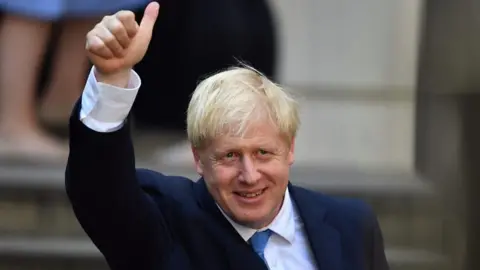 Getty Images
Getty ImagesBoris Johnson will return to Downing Street with a big majority after the Conservatives swept aside Labour in the general election.
In Wales, the Tories have claimed six key seats from Labour.
Sarah Atherton won in Wrexham, followed by Virginia Crosbie taking Ynys Mon and Fay Jones in Brecon and Radnorshire.
Labour remain the biggest party, while Plaid Cymru held its four seats, but the Lib Dems have been wiped out after Jane Dodds was ousted by Fay Jones.
But with a huge majority for Mr Johnson in Westminster, what does this mean for Wales?

Decisions on education in Wales are made by the Welsh Government, so in theory whoever is in Downing Street after the election will not change anything here.
But in politics, nothing is quite that clear-cut.
Putting aside decisions on funding, and cash which could come to Wales as a result of that, Mr Johnson's policies on universities may have the most direct impact.
He is non-committal at the moment, but if he cuts tuition fees in England, thousands of Welsh students who study there would see the effect and there would be pressure for Welsh universities to follow suit.
But Brexit is the bigger immediate issue for universities on both sides of the border.

A Conservative majority should mean Mr Johnson is able to get his Withdrawal Agreement with the EU through Parliament.
However, the prime minister has said he wants a trade agreement to be negotiated with the EU by the deadline of December 2020.
Businesses will be watching what shape that takes.
Companies have also raised concerns about the points-based immigration system the government will introduce, fearing it will not be flexible enough to deliver the skilled workforce they need.
The Conservatives are committed to every home and business having full fibre fast broadband by 2025, though the Welsh government will also be involved in the delivery of that.
Better infrastructure will generally be welcomed by business, but some of the pledges made on this by the Conservatives are devolved.
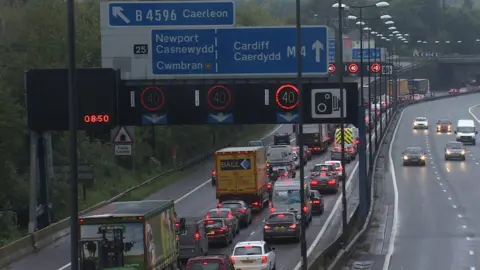
An M4 relief road, the dualling of the A40 to Fishguard and the upgrade of the A55 were all in the Tory manifesto but would be decisions for the Welsh government.
Similarly, the manifesto promised help for small firms - including with business rates - though these are also devolved.
Even if changes in England by the UK government result in more money for Wales, it is the Welsh government who will decide how it is spent.

We are in the middle of a major transformation of the welfare system. Had Mr Johnson been turfed out of Downing Street, it could have ground to a halt.
Now he is back in power with a majority government, the introduction of Universal Credit will roll on.
More than 130,000 people in Wales receive it. Thousands more will switch to the new system. Eventually, it will be paid into the accounts of a quarter of Britain's working-age population.
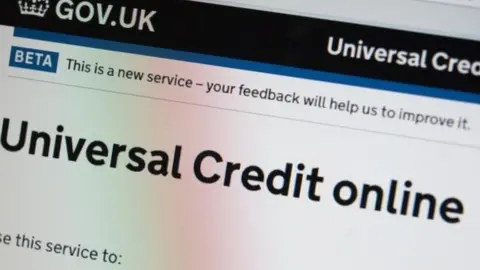
Critics have said Universal Credit is an example of how the least well-off have shouldered the burden of austerity.
The Tories are not immune to those complaints. Their manifesto promises to "do more to make sure that Universal Credit works for the most vulnerable".
Next April, credit payments and jobseeker's allowance will increase 1.7%, ending a freeze introduced by then-Chancellor George Osborne in 2016.

The Conservative manifesto said TV licences for the over-75s should continue to be funded by the BBC, a scenario which the broadcaster had previously warned would result in "unprecedented closures" of some of its services.
The BBC has estimated the cost of funding the licences would reach £745m by 2021-22, a fifth of its budget.
Earlier this year, it announced it would only continue to fund free licences for some low-income households, with the change set to take effect in June 2020.
Mr Johnson also questioned how much longer the TV licence fee could be "justified" during the campaign trail.
It means an early battle between the new government and the BBC if the Conservatives' pledge is to be enacted ahead of the proposed changes in June.
Separately, the boardroom at Welsh language broadcaster S4C is still waiting for a new chairman after the appointment of a replacement for Huw Jones was delayed by election rules.
David Jones and Rhodri Williams are understood to have been under consideration for the role, but the process of announcing the successful candidate was paused once Parliament was dissolved.
S4C management will also be keenly monitoring the debate over the TV licence fee and the BBC's concerns over its cost, given that much of S4C's budget comes from the licence fee.

Policies around criminal justice have featured prominently ever since Mr Johnson stepped into Number 10.
The party has already started work on the promises of 20,000 additional police officers - replacing the number cut under previous Conservative governments - and 10,000 more prison places.
If they are true to their manifesto pledges, the Conservative government will also give more powers to the police and courts.
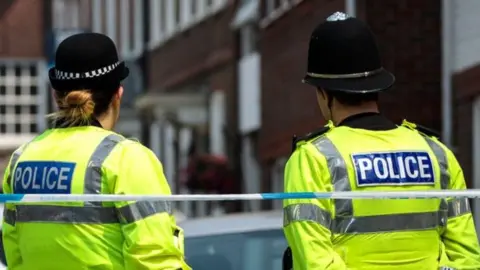 Getty Images
Getty ImagesThose convicted of knife crime will be stopped and searched more easily, a person convicted of a serious crime will no longer be automatically released after serving half their sentence and child murderers will serve life without parole.
There will be laws on domestic abuse and victims' rights, a review of the parole system, tighter curfews for those given community sentences, as well as an increase in the hours they will do.
A promise to empower police to safely use new tech such as biometrics and AI (within strict laws) also suggests increased use of the controversial facial recognition technology.

If the Conservatives' promises of extra cash and staff for the NHS in England are delivered, then the Welsh Government would be under pressure to spend any extra money that would come to Wales as a result on the NHS as well.
During the early part of this decade, the NHS budget here was squeezed more than in England and a subsequent dip in performance meant the NHS in Wales soon became a political football.
Labour in Wales, particularly in the run-up to the Welsh election in two years' time, presumably will want to avoid being accused of being less generous to the health service, but that causes a headache for politicians in Cardiff Bay.
About half of the Welsh Government's day-to-day budget is already spent on health and there are growing concerns other areas such as council services are increasingly being squeezed out.

Brexit will change trade because businesses in Wales have become interconnected with EU firms, particularly red meat and shellfish producers and the automotive sector.
The Conservatives say that will be replaced by an independent trade policy.
Free ports will be established - something Milford Haven has been arguing for.
No increase to income tax, VAT or National Insurance (NI) but employees would not start paying NI until they earned £9,500 a year.
A UK Shared Prosperity Fund would replace EU money to the poorest areas, including Wales, to match the level of funds from the EU and a cross-border Marches Growth Deal and existing public transport upgraded in city regions.

So what does the result mean for arguably the challenge of our times - tackling climate change?
While other parties had more ambitious plans to reduce emissions - the Conservatives stuck to a target announced under Theresa May for ending the UK's contribution to global warming by 2050.
It follows independent advice from the Committee on Climate Change - which said Wales would play its part in reaching what's known as net-zero if it achieved a 95% cut in greenhouse gases by the same year.
This is set to be very hard to deliver and will require big changes, mainly to how we generate and use energy.
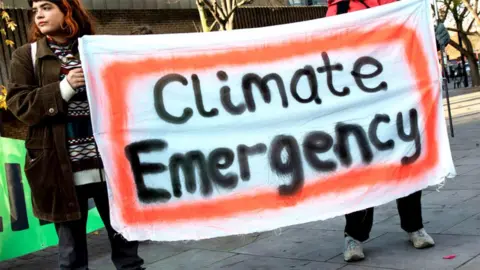 Getty Images
Getty ImagesThe Conservatives have pledged to invest in big offshore wind farms, so we may well see more being built in Welsh waters.
But those hoping for more support for onshore wind, solar and a resurrection of the Swansea Bay Tidal Lagoon project, promised by other parties, will be disappointed.
